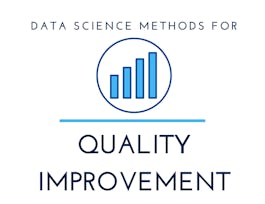This course is designed to guide you on how to prepare for the American Society for Quality Certified Six Sigma Black Belt (ASQ CSSBB) certification, a mark of quality excellence across industries.



Advanced Statistical Analysis and Tools
This course is part of ASQ-Certified Six Sigma Black Belt (CSSBB) Exam Prep Specialization


Instructors: Skill-Up EdTech Team
Sponsored by InternMart, Inc
Recommended experience
What you'll learn
Identify the statistical analysis tools required for quality and process improvement in each phase of the DMAIC methodology.
Describe the statistical processes of each phase of the DMAIC methodology used for operational efficiency.
Apply statistical analysis tools for representing relationships, analyzing systems, and testing hypotheses.
Implement design experiments and apply statistical process control to streamline business processes.
Skills you'll gain
- Statistical Methods
- Statistical Modeling
- Analytics
- Six Sigma Methodology
- Operational Excellence
- Process Improvement
- Statistics
- Statistical Inference
- Sample Size Determination
- Lean Six Sigma
- Process Improvement and Optimization
- Statistical Analysis
- Correlation Analysis
- Process Analysis
- Quality Improvement
- Data Analysis
- Process Capability
- Regression Analysis
- Statistical Process Controls
- Statistical Hypothesis Testing
Details to know

Add to your LinkedIn profile
8 assignments
See how employees at top companies are mastering in-demand skills

Build your subject-matter expertise
- Learn new concepts from industry experts
- Gain a foundational understanding of a subject or tool
- Develop job-relevant skills with hands-on projects
- Earn a shareable career certificate


Earn a career certificate
Add this credential to your LinkedIn profile, resume, or CV
Share it on social media and in your performance review

There are 4 modules in this course
In this module, you will learn about the various statistical tools you can use for process analysis and data collection. The module delves into the statistical technique of measurement system analysis (MSA). You will also learn how to use graphical tools to construct and interpret diagrams and charts. You will be equipped with how the results of statistical studies are used to draw valid conclusions, the distribution methods relevant to probability, and the techniques used for process capability. Finally, you will learn to interpret the difference between short-term and long-term capabilities.
What's included
8 videos2 readings3 assignments1 discussion prompt
In this module, you will learn how to measure and model relationships between variables. You will explore the correlation coefficient, linear regression, and multivariate tools. The module also delves into applying the key concepts of hypothesis testing, such as the significance of testing, calculating sample size, and analyzing waste. You will become acquainted with techniques such as point and interval estimates and tests for means, variances, and proportions. Additionally, you will learn the analysis of variance (ANOVA) and goodness-of-fit (chi-square) tests and the techniques for analyzing and managing risk.
What's included
7 videos1 reading3 assignments1 discussion prompt
In this module, you will explore the key concepts of the design of experiments (DOE). You will also learn how to apply the principles of DOE, such as power, sample size, balance, repetition, replication, order, efficiency, randomization, blocking, interaction, confounding, and resolution. The module will take you through planning and evaluating different types of experiments in DOE and various types of Lean methods you can use for process improvement, like waste elimination, cycle-time reduction, Kaizen, and others. Additionally, the module focuses on statistical process control (SPC) and other controls that help to streamline business processes. Finally, you will learn how to sustain process improvements using methods like documentation, training, and evaluation.
What's included
5 videos1 reading2 assignments1 discussion prompt
This is a peer-review assignment based on the concepts taught in the Advanced Statistical Analysis and Tools course. In this assignment, you have been provided with a real-life scenario. You must explain how you can use process capabilities and their related metrics in process improvement.
What's included
1 video2 readings1 peer review
Offered by
Why people choose Coursera for their career




Recommended if you're interested in Data Science

Johns Hopkins University

University of Colorado Boulder

University of Colorado System

University of Colorado Boulder

Open new doors with Coursera Plus
Unlimited access to 10,000+ world-class courses, hands-on projects, and job-ready certificate programs - all included in your subscription
Advance your career with an online degree
Earn a degree from world-class universities - 100% online
Join over 3,400 global companies that choose Coursera for Business
Upskill your employees to excel in the digital economy


